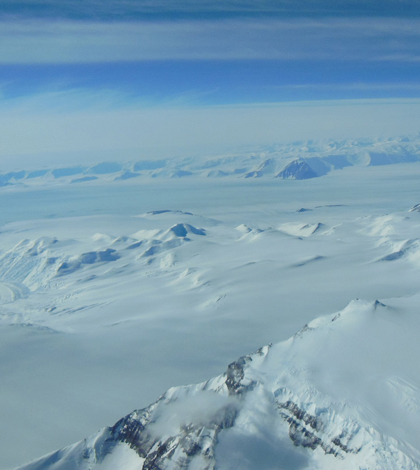Earth’s Gravity Field Altered By Huge Antarctic Ice Loss

A view of Antarctica’s ice sheet and mountains seen from a U.S. Air National Guard LC-130 aircraft during a flight to the South Pole in December 2012. (Credit: NASA/Christy Hansen)
Researchers from the University of Bristol report sudden losses in Antarctic ice so large they have impacted Earth’s gravity field, according to a press release from the university.
The Southern Peninsula of Antarctica has not undergone much study in the past, as scientists did not see much variation in the region during previous missions. But the characterization of the Southern Peninsula as relatively stable has undergone rapid reassessment: Since 2009, glacier melt there has gone into overdrive, dumping some 55 trillion liters of water into the ocean each year. The sudden glacier melt did not seem to be linked to higher air temperatures or a lack of typical snowfall. Researchers attribute the change to warming ocean waters instead.
Radar data from the CryoSat-2 satellite from the European Space Agency alerted researchers to the changes in the amount of ice in the region. Radar pulses from the satellite went to the ice sheet and reflected back to the satellite. The pulses’ travel time indicated changes in sheet ice levels with great accuracy. The losses were so great that another satellite was able to detect changes in the Earth’s gravity field.
Top image: A view of Antarctica’s ice sheet and mountains seen from a U.S. Air National Guard LC-130 aircraft during a flight to the South Pole in December 2012. (Credit: NASA/Christy Hansen)v











0 comments